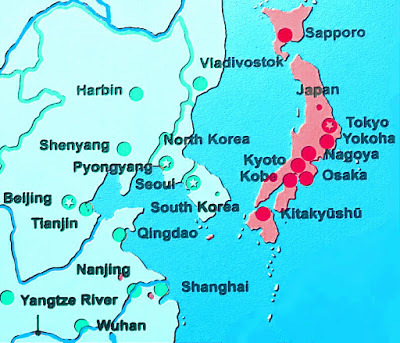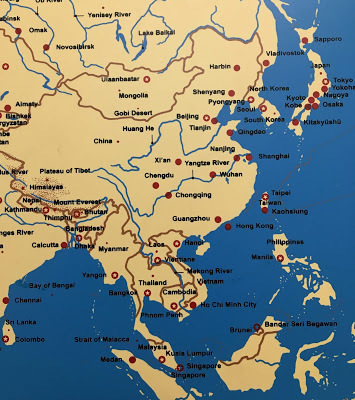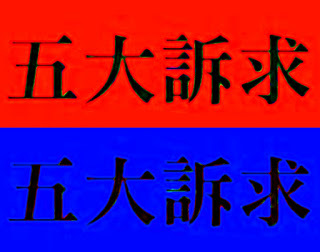John Janaro's Blog, page 113
October 14, 2020
War and Peace and Japanese Cartoons Everywhere
 For many decades now, it seems that Japanese cartoons and animated series are everywhere. This is, in part, attributable to their creative and vivid storytelling, innovative design, hard work, and clever marketing.
For many decades now, it seems that Japanese cartoons and animated series are everywhere. This is, in part, attributable to their creative and vivid storytelling, innovative design, hard work, and clever marketing.But there's more to it than that.
Anime treats in certain ways some of the concerns of my "East Asian Studies Project" (that I described in a previous post, HERE). It emerges against the backdrop of the pervasively influential (and in some ways traumatic) "invasion" of East Asia by Western ideas, influences, and power over the past century and a half.
In the throes of its own cultural crisis and change, the West flooded this region of ancient interconnected (yet often mutually hostile) societies and cultures with a spectacular mashup of the whole Western heritage: the good, the bad, and the ugly.
Japan was affected in a very particular way by what I have called the "East-West collision" of the 19th and 20th centuries. Therefore, it's useful to view the Anime phenomenon in the larger context of the historical conditions from which it arose.
Here I would like to put forth a few observations that are necessarily incomplete and by no means exhaustive (e.g. there is the whole specific story of the development of animation in general, and the way pioneering animators on both sides of the Pacific Ocean mutually influenced one another). I limit myself to the broader sociological view, which is a difficult endeavor when trying to assess the long (and ongoing) Japanese experience of the West in all of its peculiar complexity.
The crucial point here, obviously, is that for Japan, the "East-West collision" included a war that was unprecedented in its magnitude and destruction.
We now are beginning to have enough "historical distance" from the most intense moments of Japan's 140 year modern relationship with the West to risk moving beyond the partisan narratives of the brutal conflict in the Asian-Pacific "theater" of World War II. Indeed, it is time to sketch a larger perspective that is more fully objective about the multifaceted events that took place in the war. This is not to challenge the established (and undeniable) consensus that the Japanese government and military waged an intolerable and criminally aggressive war of conquest in Asia and the Pacific. Defense against Japanese aggression was in principle necessary and just, and considerable effort went into meeting many of the demands of justice in practice.
Japan's invasion of China, the brutal attacks by Japanese soldiers against Chinese civilians, and the (at least ferociously disproportionate) preemptive strikes and/or offensive territorial seizures of places under USA or British governance (notwithstanding Japan's stated motives of combatting Western imperialism) all point to the extremely violent and dangerous elements of Japanese militarism in this period. Whether these violent tendencies remain latent in Japan's national identity, manifest themselves in other ways, or might reemerge in revived forms is difficult to predict. Japan's current system of government with its political process has overall responsibility in this area, and - having demonstrated cooperation and good faith for over seven decades - it deserves the corresponding degree of trust from regional and international partners in addressing the violence in its own heritage.
But how did this conflict emerge in the first place?
After the West's forcing open of Asian markets in the mid-19th century (which launched a cultural revolution in Asia beyond anyone's expectations), Japan's apparently wholesale adoption of Western social forms gave the impression that it had entered "the modern world" (a term still filled with "enchantment" in the West and regarded as an unqualified good). As already noted, however, the West rushed into enagement with East Asia on many levels at this time, thanks in large part to the advances in shipping technology (not least of which was the steam engine) that made unprecedented global interaction possible. The result was that the very different sets of cultural forms of the Western world and East Asia crashed into one another in an experience fraught with mutual misunderstandings, with the West bringing to bear the pressure of its superior material power to impose its structures and patterns in the East. What furthered the traumatic charactor of this imposition was that the West itself was in the midst of a crisis regarding the meaning of its own structures. What was exported to Asian peoples at this time was therefore very much a "mixed bag" of good and bad tendencies of material progress, and conflicting ideas about their significance.
Japanese culture, however, used its genius for adaptability to rapidly integrate the whole Western "package" (and all its good, bad, and ugly aspects) into Japan's own native idealistic renaissance and reinvigorated martial spirit. The result was an admirably dynamic but also inherently unstable and even volatile emerging culture. Not suprisingly, extremists with sweeping visions of grandeur rose to positions of leadership. The drums of war - amplified now by microphones and dispersed everywhere by radio - began to beat.
 By the middle of the 20th century, Japanese militarism was using its own "Westernized forces" to pursue a nationalist and regionally imperialist agenda. Ultimately, Japan became first the perpetrator of the horrors of technologically advanced "total warfare" on its neighbors, and then the catastrophic victim of the West's newer, savage, unprecedentedly brutal war technology that brought the Japanese people to a condition of devastation and utter humiliation. Japan has since been excluded from direct participation in the (ongoing) war culture, but it has regenerated on an even larger scale its industrial and financial "success" using Western ideas, and has become an innovator (along the lines of Western development) in engineering, electronics, and digital technology. Today, Japan is "more like us" than ever... or so it appears.
By the middle of the 20th century, Japanese militarism was using its own "Westernized forces" to pursue a nationalist and regionally imperialist agenda. Ultimately, Japan became first the perpetrator of the horrors of technologically advanced "total warfare" on its neighbors, and then the catastrophic victim of the West's newer, savage, unprecedentedly brutal war technology that brought the Japanese people to a condition of devastation and utter humiliation. Japan has since been excluded from direct participation in the (ongoing) war culture, but it has regenerated on an even larger scale its industrial and financial "success" using Western ideas, and has become an innovator (along the lines of Western development) in engineering, electronics, and digital technology. Today, Japan is "more like us" than ever... or so it appears.So, is the Japanese identity crisis a "thing of the past"? Has it moved on from wartime defeat and destruction, and decided to embrace "the Western road"? I don't really know the answer to that question. Japan today is hard to fathom. It has possibilities and problems similar to those in the West, but it faces distinctive challenges as well. Anime is an interesting medium for a mature observer to see these various tensions "played out" in diverse ways in a vast imaginative space.
Meanwhile, the real Japan remains enigmatic beneath its Western dress. It is a secular, materialistic, work-obsessed, often-lonely place. Economic assessments of material properity and productivity do not necessarily reflect these cultural factors (at least, not yet). In particular, the Japanese family has become fragmented and the newest generations are shrinking alarmingly under the looming shadow of demographic winter (caused, in part, by yet another, more recent Western imposition: an ideology-of-sterility implemented by a relentless technological invasion of the human ecosystem).
Yet the Japanese have not forgotten their history, their ideals, or their great sense of integrity, and they long for the lost solidarity of their families (which still exercises a defining, even though increasingly impotent, influence on their view of themselves and their own success).
Also, the Japanese people - who during the war were largely victims of isolation from information, relentless propaganda, and a distorted, manipulated sense of "patriotic duty" - have since tried to embrace non-violence (an approach that also has roots in their tradition). They profess it sincerely, but inwardly there is much complexity and obscurity in their struggle to make this ideal their own. The Japanese are wrestling with what it means for human beings to use physical force against others, in what manner (and when) it may be appropriate or necessary, and what dispositions are required to keep force with the limits of respect for the other person. I think basic intuitions of morality (which we find at the foundations of "natural law" ethics) are being brought into consideration in a manner that has a certain freshness to it, like firm ground rediscovered in the midst of an ongoing overall disintegration. We see examples of Japanese culture today working through these questions and difficulties in original ways, including in the development of new schools of karate and other martial arts.
Anime is also a forum where imaginary realms visualize these questions, the perplexity involved in them, and the consequences of transgressing the limits of force and indulging in violence. The context of this struggle for understanding and coherence is a story intended to "entertain" but that also moves within a spectrum of "attitudes" ranging from high idealism to deep cynicism. These cartoons (intended for adults) are most interesting when they are neither ideologically didactic nor morbidly aimed at providing vicarious indulgence of the urge for violence as revenge or self-destruction; they are most interesting when they present complex characters in empathy-engaging circumstances that are resolved imperfectly. Thus, imaginary universes with monsters and mythical creatures can simultaneously "entertain" by taking the viewers to a different world, amaze them with rich and original artwork, and mirror something of the viewers' own struggle with issues of the ambivalence and the problematic nature of "using force" in the context of some kind of ideal of non-violence. Anime also can reveal a society still seeking (often in repressed ways) the meaning of its own enduring pain.
This is not surprising, because in Japan the wounds of their last war remain open. The necessary repentance for their own crimes against their Asian neighbors (especially China) is mired in difficulties - not only because of their own pride but also because of China's tumultuous post-war history.
Moreover, deep down they have not forgotten the (arguably disproportionate) punishment imposed upon them for their own arrogant imperial ambitions: the massive direct attacks against their civilian population by incendiary bombing, and of course the unprecedented, horrifying liquidation of two cities by nuclear weapons whose damaging after-effects are still unknown.
All of this was "justified" (according to a coalition led by Western powers) by the need to defeat Japan's extremist militant aggression. But the Allied Powers sought not just any ordinary victory. They were determined to coerce an unconditional surrender not only of Japan's armed forces but of the governance of the whole nation. The Japanese ultimately put their entire country into the hands of a coalition of "United Nations" that included one nation (the Soviet Union) whose leadership had perpetrated far more "crimes against humanity" (including genocide) than were ever dreamed of even by the most monstrous, deluded Japanese practitioners of neo-bushido ideology and its barbarous war crimes in the region.
Imperialist Japan had many foolish dreams regarding the domination of East Asia, and aims that its armies and navy pursued recklessly, without regard for human dignity or human life. But it had at least one instinct rooted in reality, and that was its fear of communist aggression from the north with the intention of establishing Stalinist hegemony in the region. Notwithstanding the arrogance of the Japanese imperialists themselves, this instinctive fear turned out to be eerily "prophetic."
Nevertheless, the Soviet Union played no role in the occupation of post-war Japan itself, in spite of Stalin's gigantic eleventh hour entry into the Pacific War with the Soviet invasion of Manchuria at 12:01 AM on August 9, 1945. The one-and-a-half-million men of the (Soviet) Red Army who poured into China and Korea would, nevertheless, have a decisive impact on the future of those countries. Japan was entrusted entirely to the USA, and was treated with an undeniable generosity and subsequently protected during the Cold War era.
Over the past 75 years this has appeared to be unalloyed "win-win" situation for both countries, but beneath the surface it remains a complex, ambivalent experience that Japan still wrestles with. Its effects on Japan's sense of pride, honor, national identity, and capacity for an integrally human development are difficult to measure. There has been much good, and yet - as indicated above - all is not well, and scars and malformations abound that hinder in some respects the human and spiritual energies of the people.
It is important to understand all the factors of a wounded perspective that still festers in Japanese society, and to remember that ancient peoples hand down their resentments from generation to generation. Still, this is only one aspect among many conflicting memories evoked by the whole national effort of Westernization, including the rapid influx of often partial and distorted Western ideas. Underlying everything, there remains the serious search for identity that the Japanese people cannot escape, as they are confronted with basic questions underlying all the particular details of their gigantic ancient post-modern dysfunctional Japanese society -- questions about what it means to be human.
All these considerations are applicable to a lot more things than Anime, but they're part of what these cartoon stories are involved with: pieces of a shattered cosmos of mythology and ancient customs of honor and propriety combined with Western science, the shattered fragments of Western humanism (and the sometimes-distorted shadows of the Christianity that once informed that humanism), and the peculiar historic experience of a complex combination of Western technological violence and Western magnanimity. It's all in the mix, along with the existential drama of living with freedom and aspirations and responsibility for the good that every human being goes through, AND (in Japan the still mostly hidden and mysterious) provocations of the grace of redemption and transfiguration.
 In any case, we can't ignore the universe of Anime, and the diverse themes it deals with: from nihilism to the search for deeper identity and moral conviction. It shows us much in particular about the last several generations in East Asia (especially in Japan, where there has been 75 years of often perplexed but persistent soul searching) as they struggle to "re-create" and clarify their identity in the midst of a globalized world order of Western-influenced post-World-War-II technological-power-defined societies.
In any case, we can't ignore the universe of Anime, and the diverse themes it deals with: from nihilism to the search for deeper identity and moral conviction. It shows us much in particular about the last several generations in East Asia (especially in Japan, where there has been 75 years of often perplexed but persistent soul searching) as they struggle to "re-create" and clarify their identity in the midst of a globalized world order of Western-influenced post-World-War-II technological-power-defined societies. We also need to look at why Anime has had such a universal impact on youth culture everywhere as well as the ambivalence of that impact - which sometimes appeals to aimless or bizarre violence and domination, bleak despair, superstitions or vacuous fantasies, but in other instances has some positive elements that revive perennial mythic expressions of good-versus-evil and the drama of human freedom struggling for the good.
In a world of flattened, exhausted imagination dominated by the milieu of materialistic consumption and the absence of the search for meaning and transcendence, the Japanese animated story may be one of the protagonists leading the way (for better or for worse) in the direction of a renewed human fascination with myth and symbolism.
To be continued...
October 11, 2020
"He Will Wipe Away the Tears From Every Face"

The Lord "will destroythe veil that veils all peoples,the web that is woven over all nations;
he will destroy death forever.
"The Lord God will wipe away
the tears from every face;
the reproach of his people he will remove
from the whole earth; for the Lord has spoken.
"On that day it will be said:
'Behold our God, to whom we looked to save us!
This is the Lord for whom we looked;
let us rejoice and be glad that he has saved us!'"
~Isaiah 25:7-9
October 10, 2020
Christina Grimmie: "I'm Feeling So Alive"

"Everything's all right. I'm feeling so alive..." (Christina Grimmie - image from the movie "The Matchbreaker").
This is our hope for all our loved ones who have passed from this life into the embrace of the Infinite One who is merciful Love beyond all measure.
Each month Christina shines her bright beautiful light on that hope, and I find that I have a little more strength for what remains of my own journey, and a little more depth of conviction that the fulfillment of my journey is not extinction but the Life that has overcome death.
In these past couple of years, there have been some months when I have really needed this strength. So, once again, four years and four months after she passed from this life, I remember Christina Grimmie. Dear, dear Christina, thank you!
October 9, 2020
Dear Brendan McGuire, Rest in God's Peace
 Today the whole university community at Christendom College joins many friends and family in mourning the loss to this world of Professor Brendan McGuire, who died of cancer early this morning. We entrust his good soul to the Lord with prayer in the firm hope of eternal life through Jesus Christ. We pray especially for consolation for his wife and children, and an abundance of God's mercy and healing.
Today the whole university community at Christendom College joins many friends and family in mourning the loss to this world of Professor Brendan McGuire, who died of cancer early this morning. We entrust his good soul to the Lord with prayer in the firm hope of eternal life through Jesus Christ. We pray especially for consolation for his wife and children, and an abundance of God's mercy and healing.Brendan was my student, long ago. Part of me will always remember him as "that incredibly bright kid" (teachers always remember "the kid" you once were, and will still see that young person who remains "part of you" no matter how old you get). But time moves fast, and soon he was my colleague. Then he was a much-loved professor to my own kids.
He was also, for years, a witness to us all of faith, courage, and even a remarkable joy in the midst of great suffering. He was an accomplished scholar and a brilliant teacher, and a wonderful, strong, humble, charitable man. Even when facing very difficult and painful periods in his long battle with cancer, he showed appreciation and gratitude for the smallest things in daily life. He lived his days fully, with vigor and all the energy he could muster, because he had hope for eternal life. He saw, in the seeds sown in the ground of this world, the beginning of the garden of the New Creation where Jesus transfigures and brings to fruition all the good we have done.
What immense sorrow this brings (in different ways) for so many people! Sorrow and grief are mysterious things which we cannot avoid enduring in this world. They especially are the human things that would seem to have no resolution, but we know by faith that the Risen Jesus transforms even our sorrows from within by His love that has overcome death.
Lord, grant eternal rest to Brendan and let perpetual light shine upon him. And by your mercy, give spiritual healing, strength, and peace to his wife Susan and their children. Dear God, also grant consolation and encouragement to family, friends, colleagues, students, the whole Christendom community and our local parish community.
And may the Lord have mercy on us all.
October 8, 2020
"Now He's Becoming a Horticultural Nerd Too?"
 I saw colored leaves on this bush and thought, “There IT IS!! Fall is HERE!” But, after checking my "plant identifier" app, I’m... not so sure.
I saw colored leaves on this bush and thought, “There IT IS!! Fall is HERE!” But, after checking my "plant identifier" app, I’m... not so sure. The Nandina schrub (an Asian import popular in Japanese gardens) apparently has leaves all year round and its own schedule for dropping the red ones. This is an unusual, colorful bush.
Those red berries add further visual variety (and they usually get bright red). That's important to remember, because “bright red” is nature’s “DANGER: POISON” sticker.
The entire plant is “cyanogenic” — so it can kill birds or small animals if they eat it, and you... shouldn’t put this in the salad (why would you want to?
October 6, 2020
Saying Goodbye to a Pioneering Guitarist
As you know by now, this blog is one of the few places on the internet where we address everything from saints to rock stars! Today brings sad news about Eddie Van Halen. RIP to another guitar legend.
October 5, 2020
JJ's "East Asian Studies Project"
 I want to introduce here some important scholarly work that I have been engaged in for the past three years on a consistent basis. I generally refer to it as my East Asian Studies Project.
I want to introduce here some important scholarly work that I have been engaged in for the past three years on a consistent basis. I generally refer to it as my East Asian Studies Project.My primary focus has been and continues to be China, where a fifth of the world's population lives. It wasn't until I reached my mid-50s that I realized that my knowledge about China was ridiculously superficial. After many years of historical study, I had little more than an introduction to China's immense history and culture, its geography and natural riches, its people[s], their language[s], their pictographic writing, their unique literary tradition, etc. And yet China is everywhere in the world today. It is becoming positively silly to think that we can speak about the world of the 21st century and know nothing about China.
Venturing into China (by way of study), I have also found the need to do justice to the various related peoples of the region, who have their own proud histories, traditions, and languages while also intersecting with China over the course of more than a millennium: the Japanese, Korean, Filipino, Vietnamese, Cambodian, Thai, Malay, and (to some degree, at least) Mongolian and East Turkic peoples, as well as the diverse minority groups living among these peoples. This is a broad research project that I think is crucial for the 21st century (even though I'm probably too old to do much of it - at least I can point others in the direction): appreciating East Asian history and understanding Asian societies in the new directions they are taking today with all their raw and rapid flow of novelty (and how these "new directions" - often drawn from the influence of the West and interestingly adapted - relate to their roots and their future).
I believe we Westerners need to learn a lot in order to grasp the importance of "building bridges" and deepening the dialogue with this universe of peoples, whom we too often stubbornly insist on caricaturing or misunderstanding. We especially need to be able to pay careful attention to what has happened over the course of the past century-or-so in what used to be called "the Far East," and what continues to happen today.The multifaceted, complex, and (from a historical point of view) very rapid series of events that continue to tear asunder and reconfigure life on "the other side of the world" cannot be accurately described in a few sentences. But generalizations do serve useful purposes. They can help us "map out" some of the terrain that we must travel through, and give us some perspective on the noteworthy things we might encounter therein. They also help us formulate hypotheses as we go along (hypotheses which, of course, must be tested, refined, or altered according to what we learn from experience). In the increasingly interactive global village we live in, it's all the more important to "get to know" our global "neighbors," to build bridges of mutual understanding, to peacefully coexist (at least) and even collabrate fraternally on common (and urgent) problems the whole village must face, as well as building mutually enriching relationships.
Let me, therefore, start by proposing a few generalizations. Over the past century-or-so, the peoples of East Asian societies (whose identities were long and deeply rooted in ancient "pre-Christian" cultures) have been experiencing the impact of a sudden, widespread, and often traumatic "involvement" with the Western world. It was (and continues to be, even with the emergence of powerful responsive and increasingly original reverberations generated by Asians themselves) predominantly a massive and pervasive encounter initiated and precipitated over time by the West.
Many, many good things have come about as a result: tremendous goods and dimensions of human development that no one would want to reverse. Indeed, the way forward is clearly one of dialogue and integration, rather than disconnection. This point is very important to establish and refer to wherever (and insofar as) it applies to our understanding of one another.
The first thing people would be inclined to point to as an unqualified good is the prolific material prosperity in so many areas of the region today. But I think that "the increase in power over material things" is by itself an ambivalent indicator of the health of a society in its properly human realm: its culture, its awareness of the dignity of the human person, its organic communities and healthy sense of inclusiveness, its pursuit of justice and equity, its governing systems, and its regard for the ultimate meaning of life.
Here we need to examine more closely how the historically "recent" phenomenon of East-West interaction came about. Clearly what made it possible were the (previously unimaginable) developments in the West of technology for rapid, convenient transportation and mass communications, as well as the continued expansion of the industrial revolution and everything that followed from it. Thanks to these unprecedented innovations - which also spurred the invention of the technologically enhanced, mass produced, and powerfully destructive weapons used in the devastating wars of the 20th century - we could say that in a sense the West "collided into" East Asia.
This was an "encounter" that was in many respects violent. Some of the violence was "accidental" (at least, at the beginning) and good intentions abounded that brought forth many good fruits (as we noted above). But in many respects the encounter and subsequent "engagement" was (and continues to be) an upending of Asia extending beyond anyone's intentions or control, a "collision" resulting in many abrupt changes and their often unforeseen consequences, precipitated over the course of a century-or-so by the West.
 The Western world brought its "way of life," haphazardly but rapidly and relentlessly into a very different environment it failed to understand. It overwhelmed many Asian peoples, while others adopted one or another aspect of it and turned it to their own purposes. There were some (but not nearly enough) engagements that took root with patience, flowered through mutual exchanges, and bore fruit in enduring friendship. When this happened (even imperfectly) the results included the emergence of people on both sides - Asian and Western - with a deeper perspective that is much needed in today's global village. They are "bridges" between East and West, and those who express their vision in literature and/or scholarship often do so with remarkable and much-needed insight. I am always searching for these people who are "bridges" - not because they build perfect bridges - but because of the helpful insights and perspective their efforts provide. Perhaps I should develop a reading list of authors I have found helpful in my research (some of them have already been featured on this blog).
The Western world brought its "way of life," haphazardly but rapidly and relentlessly into a very different environment it failed to understand. It overwhelmed many Asian peoples, while others adopted one or another aspect of it and turned it to their own purposes. There were some (but not nearly enough) engagements that took root with patience, flowered through mutual exchanges, and bore fruit in enduring friendship. When this happened (even imperfectly) the results included the emergence of people on both sides - Asian and Western - with a deeper perspective that is much needed in today's global village. They are "bridges" between East and West, and those who express their vision in literature and/or scholarship often do so with remarkable and much-needed insight. I am always searching for these people who are "bridges" - not because they build perfect bridges - but because of the helpful insights and perspective their efforts provide. Perhaps I should develop a reading list of authors I have found helpful in my research (some of them have already been featured on this blog).Having noted these fruitful efforts and the legacy they continue to generate, I want to return to the larger view of "the West-East collision" as a whole. What makes this especially complicated is that it reflects something much more than just an "encouter between two different types of cultures" and the crises resulting from it. Underlying the collision, and in some respects accounting for the confusion and violence it generated, was the tumultuous crisis that had already begun within the Western world itself, and that was destined to increase.
The West arrived in the mid-19th century with the intention of being a benefactor and a master, not simply because of racism, imperialism, or an insufficient education and lack of openness and patience, but also and especially to make money. In the midst of this hurricane there were great goods to share - life-giving water, healing medicines, certain approaches to political and social reform, useful technologies.
But overall what pounded itself into East Asia - beginning with gunboat diplomacy in the mid-19th century and continuing with a shamelessly-rationalized enormous drug-peddling operation, cultural hegemony, colonialism, the introduction of industrialization, consumerism, all kinds of "modernization," and a flood of "Western ideas" - was not some static, stable form of "Western Civilization." It was a strange combustible, concentrated, chaotic "mashup" of "the West" - with its heritage, traditions, and history of intellectual development mixed together and compressed by the heat of its own great crisis as it plunged (and continues to hurtle at breakneck speed) through its own disconcerting transition from "the epoch of human self-assured rationalistic organization and classification of reality" to the titanic, wildly unpredictable and more evidently ambivalent "post-modern technocratic epoch of power."
You knew I would get to the "epoch of power" eventually. It's the factor that enters into every circumstance of our recent history and current affairs (right down me writing this blog post that in a few moments will be accessible to humans all over the planet).
That, of course, is another topic. It's relevant here because some places in East Asia today (certainly China, Japan, and Korea) appear to be "ahead of" the West in heralding the new epoch of the totalization of technological power. They have grabbed it with both hands and entered into it with lightning speed. They are also exhibiting in vivid ways some of the dangers of the new epoch (China and North Korea come immediately to mind, but the social impact in other societies also bears consideration).
At the same time, the ancient heritage and the sense of life that have shaped peoples in East Asia for millennia have not disappeared. Many antiquated superstitions endure, but so does a great treasury of wisdom - religious, philosophical, cultural, and common-sense wisdom. How much of the best of this human wisdom tradition remains vital in the lives of people today? How does it "intersect" with the blinding materialism that drives the socioeconomic superstructure of China, with its evolving ideological mashup of Marxism-Leninism and Fascism (the worst fallout from the historic collision with the West) and modernized versions of the Chinese "Legalist" (anti-Confucian) tradition and the ever-resiliant imperial-bureaucratic governing forms of the past?
That's a big long question. I hope I can learn enough to know how to ask the right questions, and how to listen to people who can shed light on the unpredictable path forward, and the hope for further possibilities of East-West friendship even in the midst of the whirlwind.
October 4, 2020
The Unforgettable Saint Francis

Sunday takes precedence over Francis this year in the Roman liturgy, BUT he is impossible to forget.
Buona Festa di San Francesco!
October 2, 2020
We Are Defended By Their Protection

On October 2, the Roman calendar celebrates the Guardian Angels, who are with each person during the course of his or her life, cooperating with the Holy Spirit who leads the person on the path to the fullness of redemption and glory.
The angels too are God's "co-workers" and our helpers and friends. God's Kingdom, which is in the absolute sense His work - precisely because it is His omnipotent, unfathomable creative and recreative action, His mysterious love - generates an interpersonal communion of mercy and service, gratitude and self-giving among those who share in His life. The New Creation is a "symphony of Agape, of joy, of thankfulness" whose music has already begun now, as we journey to its fulfillment.

O God, who in your unfathomable providence are pleased to send your holy Angels to guard us, hear our supplication as we cry to you, that we may always be defended by their protection and rejoice eternally in their company. Through our Lord Jesus Christ, your Son, who lives and reigns with you in the unity of the Holy Spirit, one God, for ever and ever. Amen.




